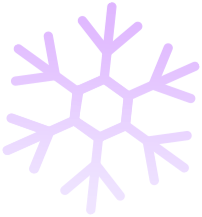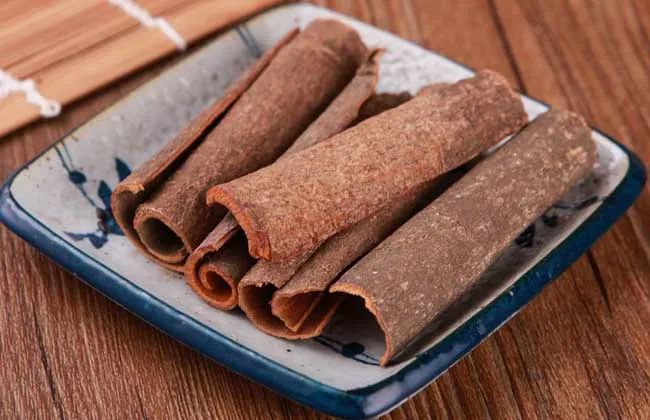
 Click the blue text to follow us
Click the blue text to follow us
Hello everyone! I am A Gan. Cinnamon (Ròu Guì) is the dried bark or coarse branches of the Lauraceae plant. It is warm in nature and has a spicy and sweet flavor. It belongs to the Kidney (Shèn), Spleen (Pí), Heart (Xīn), and Liver (Gān) meridians, and is considered a warming herb. It is both a traditional spice and a medicinal herb, known for its strong aroma. In daily life, people often use it as an ingredient in stews to enhance flavor and eliminate the freshness of meat. However, many people are not suitable for consuming cinnamon, as it can have adverse effects on their health. Next, let’s take a look at the specific benefits and contraindications of cinnamon.

Benefits and Effects of Cinnamon
1. Nourishes the Kidney and Aids Yang
Cinnamon has a spicy and sweet flavor, and is very warming. It has the effects of warming the fire and enhancing Yang, and can be used for cold in the uterus, cold pain in the lower back and knees, and shortness of breath due to Kidney deficiency. It is a key herb for treating deficiency of the Mingmen fire. For insufficient Kidney Yang and weakened Mingmen fire, it is usually combined with herbs like Wu Fu Zi (Aconite) and Shú Dì Huāng (Rehmannia). For Spleen and Kidney Yang deficiency, it is often paired with Wu Fu Zi, Rén Shēn (Ginseng), and Bái Zhú (Atractylodes), such as in the formula Yǒu Guī Wán (Right Return Pill);
2. Guides Fire Back to the Source
Cinnamon is very warming and enters the Liver and Kidney, able to guide the deficient Yang that has risen due to weak lower Yang and internal cold back down, hence the term “guides fire back to the source.” It treats deficiency of the Yuan Yang with symptoms such as flushed face, shortness of breath, sweating, palpitations, and insomnia, usually combined with herbs like Wu Shān Zhū Yú (Cornelian Cherry), Wǔ Wèi Zǐ (Schisandra), and Rén Shēn;
3. Dispels Cold and Alleviates Pain
Cinnamon disperses cold and alleviates pain, effectively removing stubborn cold and deep-seated chill. It contains cinnamaldehyde, which has anti-excitatory and analgesic effects. Cinnamaldehyde acts on the central nervous system to inhibit neuronal activity, achieving sedation and pain relief. Cinnamon can treat symptoms such as cold limbs, abdominal cold pain, reduced appetite, and loose stools.
4. Activates Blood and Regulates Menstruation
Cinnamon is warm in nature and can expel cold from the body, warm the blood vessels, and alleviate pain. It is particularly effective for women suffering from dysmenorrhea and cold pain in the limbs. Additionally, it can be used when there is Qi and blood deficiency with cold symptoms, gradually alleviating these symptoms. Cinnamon contains a large amount of cinnamon oil, which plays a significant role in promoting menstruation and can cause the uterus to be in a congested state, thus facilitating the onset of menstruation. It is commonly paired with herbs like Chuan Xiōng (Szechuan Lovage), Dāng Guī (Angelica), and Chì Sháo (Red Peony) in formulas like Wēn Jīng Tāng (Warming the Meridians Decoction).

Contraindicated Groups for Cinnamon
1. Infants
Young infants should not consume cinnamon, as their digestive systems are not fully developed, and their digestive capacity is inferior to that of adults. Cinnamon contains a large amount of volatile oils that can irritate the gastrointestinal tract, increasing the burden on infants’ digestive systems and potentially leading to abdominal pain and diarrhea.
2. Pregnant Women
Cinnamon is spicy and dispersive, which can break blood and lead to miscarriage; therefore, it should be avoided by pregnant women. Cinnamon contains a significant amount of cinnamon oil and various medicinal components that can stimulate the uterus, accelerating contractions and causing discomfort such as fetal movement instability and signs of miscarriage. Additionally, it is not conducive to the absorption of other nutrients, which is extremely detrimental to the development of the fetus.
3. Individuals with Yin Deficiency and Internal Heat
Cinnamon is very warming, and consuming it can exacerbate symptoms of Yin deficiency and excess heat, making recovery from heat symptoms more difficult. Therefore, those with external wind-heat or warm heat, Yin deficiency with heat, heat disease injuring fluids, blood deficiency with internal dryness, phlegm cough and sore throat, postpartum blood heat, deficiency of essence and blood, excessive liver fire, summer heat in children, acne, scrotal eczema, chickenpox, pulmonary tuberculosis, and hyperthyroidism should not consume it.
In summary:Cinnamon is very warming, and its use should be carefully controlled to avoid excessive amounts, which can lead to adverse reactions. It is generally not suitable for women. When used, it can be consumed as a tea or decoction.
A Gan’s Recipe
Thank you for your attention.
Remember to eat on time!
Long press to recognize the QR code to follow us.


